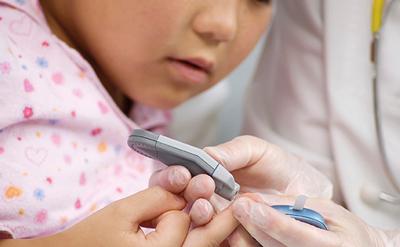Diabetes Awareness Week - How Southampton is contributing to the fight against the rise in diabetes rates

It is Diabetes Awareness Week 2018 and we sit down with Dr Nicola Englyst, Programme Lead for Southampton's MSc in Diabetes Best Practice, to talk about how the University is contributing to the fight against the rise in diabetes rates and how we are training the next generation of clinicians to meet the healthcare need head on.
Name: Dr Nicola Englyst
Position: Associate Professor and Programme Leader for MSc Diabetes Best Practice
How does Medicine contribute to the ongoing work in reducing diabetes rates?
We have a strong focus on diabetes teaching in Medicine, both at undergraduate (medical students) and postgraduate (health professionals) level. Our students gain important knowledge and skills in order to identify people at high risk of developing type 2 diabetes (such as having central obesity) and to support patients in making beneficial lifestyle changes.
Our MSc Diabetes Best Practice aims to equip individuals with the skills and knowledge to meet the future healthcare needs in treating diabetes. How does it do that?
Diabetes is a complex and multifaceted condition, and our wide range of modules allows our students to select the combination that enables them to become the best practitioner possible. We offer modules about diabetes in children (mainly type 1 diabetes) and adults (including a focus on long term complications). We have a module that explores psychological issues common in diabetes and how our healthcare professionals can use psychology to support patients. We also offer modules on the latest pharmacological and lifestyle treatments, as well as work based learning and teaching skills. Our students are supported through their dissertation projects, where they undertake a diabetes project, with an aim to presenting their work at a conference or in a medical journal.

What is your current research focus?
My research interests include microvesicles and coagulation. Microvesicles are tiny fragments released from cells, whilst coagulation is the process by which blood clots, causing heart attacks and strokes. We are looking at them in a range of conditions including heart disease and stroke which are more likely in diabetes, as well as cell-based systems stimulated with inflammatory molecules and glucose as is seen in diabetes.
Why did you decide to focus your career on diabetes education and research?
I have spent a number of years teaching diabetes to the medical students so when the opportunity arose to create an MSc in Diabetes for health professionals, it seemed like a really exciting and worthwhile opportunity. As programme leader I’ve sat in on all our teaching on the MSc and have learned many things that I just didn’t know before, and this has had a positive impact on my research too.
How would you describe the rate of progress in diabetes research that you’ve witnessed?
This is an exciting time in the diabetes research world! As well as new treatments and interventions, we are seeing a number of different systems, including stem cells, aiming to recreate the pancreas (this is the organ that is damaged in diabetes that would normally produce insulin to keep blood sugar levels constant). There is also a real interest just now in understanding the psychology of diabetes, which can have a real impact on effectiveness of treatments.
What can the general public do to prevent diabetes rates from rising?
Rates of both type 1 and type 2 diabetes are increasing in the UK and worldwide. We are unsure of why type 1 rates are increasing, but the increase in type 2 may be, at least partly, attributed to rising rates of obesity and an unhealthy lifestyle. To reduce the risk of type 2 diabetes, the general public can adopt a healthy lifestyle in terms of exercise and food, and keep an eye on their waistline. Small changes in lifestyle, such as getting off the bus a stop earlier, climbing the stairs instead of taking the lift or going for a walk with a friend, can make big changes to your health.
How has the role of women in scientific research changed during the course of your career?
The role of women in scientific research has changed during my career of 20 years. The numbers of women in science and reaching professor level has risen significantly, providing some great role models for the rest of us! Medicine at the University of Southampton is supportive of women: I was the first job-share at the lecturer level in Medicine, allowing me to balance work and home life. We also have a great mentoring scheme which has really benefited me and many other women, helping us to make well thought-out career decisions.
What would you say is your proudest career achievement?
In terms of teaching, seeing our students graduate each year is a really proud moment. They have worked so hard, and we also see how all our excellent support and teaching have helped them develop both professionally and personally. An individual proud moment for me was the nomination and award of a Vice Chancellor’s Award for Quality in 2016 for all the work I have done on the mentoring scheme.
What excites you most about the future of diabetes research?
I think that for a long time a cure for diabetes was really a dream or set in a science fiction novel. Now we are poised for innovative research that might lead to cures or significantly better management of diabetes, that will change lives for the better.